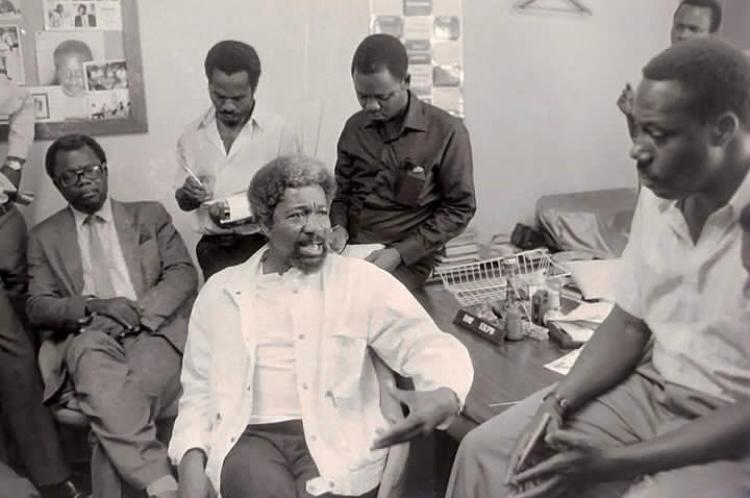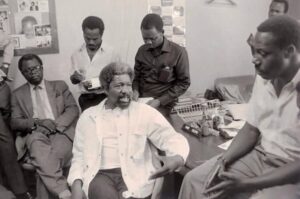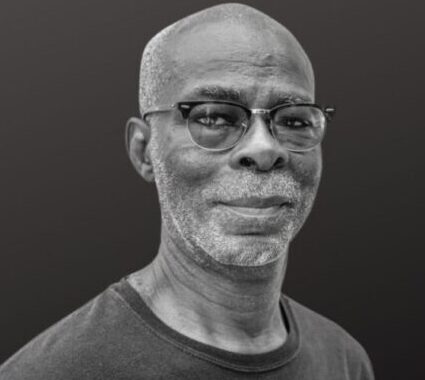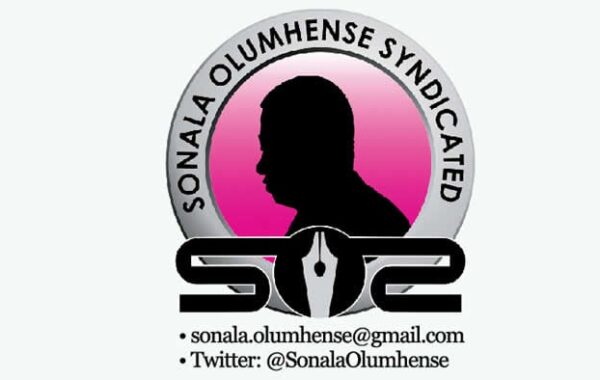
Character and Creativity: WOLE SOYINKA and the maddening crowd
I admit my bias. I have had a lifelong admiration for Wole Soyinka. Even before I had read a word he had written, to me he was special. My mother was a member of the ‘1960 Masks’, the theatre group that he founded, and I have vivid memories of Soyinka driving to our home in his rugged Land Rover in the early 1960’s. To my adolescent mind, he was a seductively Bohemian figure with his drainpipe trousers and afro hair. I longed to grow up myself, with the expectation that I would not have to comb or cut my hair either, which was a major bonus in my pre-teen world.
I had a-non speaking part, as a little child, in a production of J P Clark’s play ‘The Song Of A Goat’ that the Masks put on at the National Museum in Onikan. The play ran for four nights, and on the first and third nights, the method actor, Soyinka opted to actually decapitate the goat on stage. In addition to my walk-on part, I had the back stage task of lying behind the curtains and holding the goats legs as Soyinka treated the audience to a dose of reality in theatre. This, the stuff of which this nonconformist artist was made.
As the years went by, I gleaned from adult chatter how he continued to blur the boundaries between art and reality as he engaged with national issues, at grave personal peril; but always in the furtherance of the promise of Nigeria. In his words and actions, he embodied everything that was daring and principled even as the nation edged down the slippery slope of opportunism, coups and corruption.

For his efforts to mediate national unity, as we teetered on the precipice of fratricidal mayhem, he endured 26 months in prison; 22 of them spent in solitary confinement under the boot of the Nigerian military government. As if that were not enough, he stood up again in defense of Nigeria in the dark days of General Abacha’s military oppression, for which he was hounded into exile. He is of course possessed of unquestioned literary prowess, on the wings of which he soared to the heady heights of global acclaim.
Last year, at eighty nine years of age, after his lifelong efforts for this country could have insulated him from the rough and tumble of partisan politics, he was back in the fray. I do not mean to suggest that he should not participate in or comment on contemporary politics. On the contrary, he is singularly equipped to bring his personal insight and experience to the subject. Perhaps that is why I was so completely blindsided by his support for the presidential candidacy of Bola Tinubu. A friend of mine, who is also an admirer of Soyinka, explained it to me as a result of Soyinka’s loyalty to the friendship and camaraderie between the two men, a bond that was forged in the dangerous, difficult years while they were in opposition to military rule. I hope that this is not the case. Soyinka himself has said that it was not his practice to comment on a regime until they had been in power for a year.
The dissonance between a lifelong principled fight for democracy, and the inability to criticize a comrade who runs on a platform of ‘It’s my turn’ is dizzying. Of course Soyinka, as anyone else, has his personal loyalties and friendships, that I certainly would not presume to question, but I do wonder how he navigates the dilemma of standing with a friend, when doing so is at variance with the best interests of the country. In the past he has always shown fidelity, first and foremost to principles of honesty and truth, even when Nigeria did not reciprocate with loyalty to him. This was what set him apart, that is the cloth from which this man was cut. However, when all is said and done, he is a man. I have no right to ask him to live up to my or anyone else’s expectations in this moment. He has proved himself through trials that most of us will, thankfully, never face. Rather than question his position, each of us must answer for our own actions or inaction in this historical moment.
We are perhaps called to look for the strength of the younger Soyinka in each of us, in the face of the major challenges of our time. We are challenged to decide what we are going to do with an administration that is in power, should not be in power and seems incapable of meeting this historical moment. I question its legitimacy because too many questions are left unanswered about its ascension to power. Particularly disturbing are the as yet unexplained, election night ‘glitch’ in relaying presidential results, the challenge related to the candidate’s graduation certificates and the ethnic diatribe that emanated from the core of his campaign organisation. There is no doubt that in this age of digital technology, things go wrong. In the early hours of the morning as returns were being uploaded from the states, it is claimed that there was a technical problem that disrupted the incoming returns. Only a very few people can confirm the veracity of that claim and they are in the electoral commission. Surely, the commission has an obligation to explain to the electorate what the mysterious glitch was. Confidence in the eventual outcome requires transparency. Then the matter of the certificate, why is it important? Why is there a stipulation regarding presenting a forged certificate in the rules at all? Clearly because that requirement goes directly to the character of the candidate. If the highest court in the land cannot adjudicate on this matter, if the electoral body sees no reason to investigate this matter that is in clear public view, what do we do? What is the consequence of the ethnic diatribe spewed during the campaign, except the reward of a senior government appointment?
Why do I go back to all these issues from last year, why not look forward not backward? Because everything that we are going through today, flows directly from our willingness to put up with these questions remaining unanswered.
To those who ‘grab power’, the question is to what end, what is the purpose of having that power? Is it to reduce the gap between thought and implementation of ideas to improve the lives of the citizenry? Or is it to make more money? Or to prop up illusions of grandeur and lord it over a hapless population?
In the year since they took over the government, have we seen serious signs of executive or legislative intent or ability to chart a course through the choppy waters in which we find ourselves? The difficult situation that the country is in requires citizens to have confidence in leadership, leadership that is committed to the country, but here we are in the clutches of a cabal, whose leader told us clearly that, power would not be served up to them a la carte, that they would have to “Snatch it, grab it and run with it.” In this moment, character at the head of government is the key ingredient for our progress and that is what is missing. Character and creative thinking. On the contrary at this moment, it is said, that a bill is working its way through the legislature that will enhance impunity among politicians by proscribing a custodial sentence to anyone who disrespects or embarrasses a government official.
This is the time I think that we all need to develop a healthy disrespect for unworthy authority. I hear with incredulity friends say of the government, give them a chance, we cannot expect everything to be corrected in one year. I certainly did not expect miracles to be wrought from thin air over the past year. What I did expect and what I think that we should all demand, is that this government give a clearly defined outline of their plans for the nation. A philosophical framework explaining how each step and sacrifice they demand of the populace will bring us closer to their intended goal. I suspect that they have not done this because they have no plan, certainly none that they can share with us. If we look at the political track record of this leadership, we see a history of self-serving gaming of the economic and political system largely for personal gain.
PS. As a thought experiment; let us imagine a culturally diverse country, richly blessed with human and material resources. A country with bountiful agricultural promise, a storied educational legacy, unbridled entrepreneurial drive and a diaspora overflowing with established and emerging talent. What are the qualities that this country’s political leadership will have to possess in order to harness and direct it in a positive direction? Are those characteristics found in our current leadership? There is nothing more to say.


